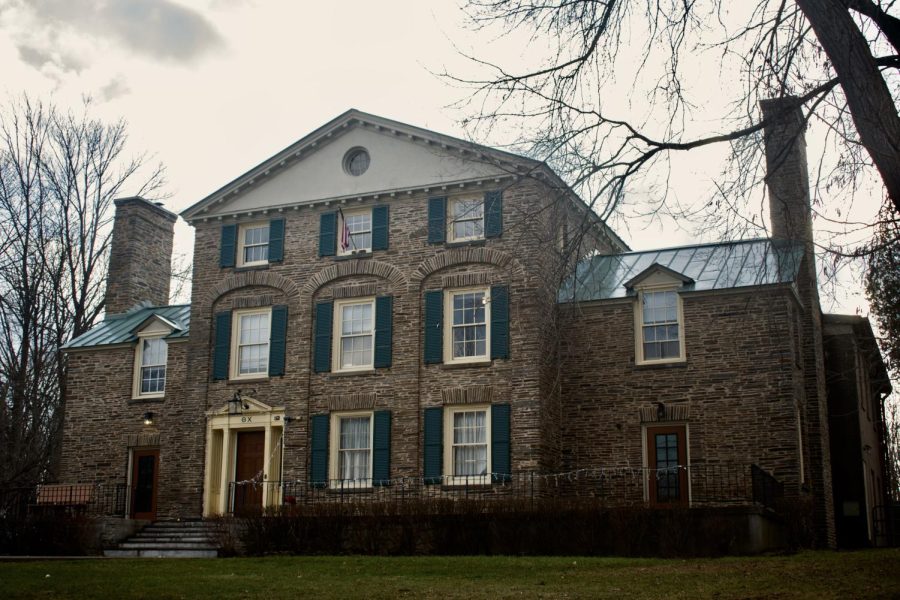Rodent Infestation at Theta Chi Prompts Resident Relocation, Extensive Extermination Efforts
Theta Chi Fraternity’s chapter house, located at 52 Broad St., has been closed as experts attempt to remediate an extensive rodent infestation, causing residents to be relocated since the beginning of the spring 2023 semester. While the Office of Residential Life was able to find other locations on campus for the students to move, it remains unclear when residents will be able to return as extermination efforts continue.
Stacey Millard, former interim director of residential life who continues to manage the situation, said University staff discovered the infestation over winter break.
“After the University residences closed in December, facilities staff observed rodent activity in the kitchen and food storage areas,” Millard said. “They immediately engaged our pest control contractor to begin remediation and to conduct a more thorough inspection. The pest control contractor was on-site regularly between semesters treating the issue with typical extermination protocols.”
While contractors attempted to resolve the issue when the house was vacant over break, the infestation grew. It became apparent, according to Millard, that the Broad Street residence would not be ready to house students again by the date of residents’ return in late January.
“As students returned in January, continued activity was observed in the house and it was determined that previous measures were not as successful as we hoped,” Millard said. “Consultation with our pest control experts determined that escalated abatement measures would require the temporary closure of the house. All 19 residents of the house were provided with temporary housing assignments on campus.”
Temporary assignments included beds at the Townhouses on Route 12-B and the Sophomore Residential Seminar House on Oak Drive.
Millard said the University is continuing to address the problem and hopes to move students back into the chapter house as soon as possible.
“Since residents left the house in January, Facilities staff conducted a thorough cleaning of the kitchen, pantry and dining area and removed any potential water and food sources throughout the whole house,” Millard said. “A full house inspection was also conducted to identify and repair any potential points of entry. The University’s pest control contractor then deployed additional bait and traps to control the infestation. A pest control technician is on-site daily to assess and respond and to provide updates to a core group of University staff who are managing the response.”
Senior Paul Criscione, one of the relocated residents, said he wished the issue could have been handled sooner.
“We had a meeting with [the Office of Residential Life] about two weeks ago,” Criscione said on Feb. 19, “and in that meeting they acknowledged that in August they were made aware of an infestation of some rodents — not necessarily rats, but some rodents. They did not believe it was an issue at the time.”
Criscione alleged that members and house staff made attempts to report the issue sooner.
“Our chef noticed the issue and made complaints to Buildings and Grounds almost every day, and then our House Manager made some complaints as well all before winter break,” he added. “After winter break was when we started getting information — that was when they hired an exterminator, but we didn’t find out that we had to move into the Townhouses until we came back from break. We would contact Buildings and Grounds and we would then get passed on to another person and everything had to be an official request. It was like phone tag, but who was going to actually take responsibility for it?”
Senior Andrew Derrickson, who also had to move out of his assigned room in the house, shared his frustration with the situation, as his room was particularly affected by the infestation.
“We were told a couple weeks later that we would need to enter the house, throw out everything that could not be cleaned (i.e. all soft furniture) or was damaged beyond repair, and catalog everything for a full reimbursement (not all members were fully reimbursed, as reimbursements were capped at $2,000),” Derrickson said. “We were also told not to bring any food or water as they claimed that the house had been wiped free of food and water sources so as not to continue to provide sustenance for the rats. When we entered, the house was visibly worse. Rooms were much worse off than the first time we entered, and members identified rat traps with no bait, a full water dispenser on the second floor, and toilets only loosely covered; clear water sources for the rats.”
Criscione also discussed his frustration, saying he felt the University placed too much blame on the residents of 52 Broad St.
“I know this can all be challenging, but I just felt like there could be a lot of blame from the University, like saying it was our fault that the place was so messy,” Criscione said. “But when we talked to the exterminator, they said that the foundation of the place was like Swiss cheese. And, yes, maybe there [were] some trash and chips left out, but when you have structural and foundational issues, it goes beyond that since the rats were able to get in. They said we should probably throw our belongings away because of the severity of the situation and the diseases that rats carry. They told us we would get reimbursed, and we’re not being nickel and dime about it, but now we are finding some struggles with reimbursements. We have set up a bunch of meetings but it was still disheartening to have to throw everything away. People threw out all their sheets and clothes and are just sleeping on blankets right now because we didn’t know how long this would take.”
While admitting that residents didn’t leave the house in the best condition, Derrickson echoed Criscione’s belief that the infestation was worsened by a lack of immediate University response.
“Our chapter recognizes a shared responsibility for the severity of the situation; the house was left in poor condition over break,” Derrickson said. “Nevertheless, it is certainly disappointing that a greater effort to eradicate the rats was not taken initially so this entire mess could have been avoided.”
Senior and House Manager of Theta Chi, Max Chirco, served as the point of contact between the fraternity, its members and University officials during the relocation of residents, which he said was challenging given the short notice.
“We were told either the day before or two days before [returning to campus from winter break] that we couldn’t live in the house, and [the Office of Residential Life] and I began working to find spots immediately,” Chirco said. “We have almost everyone in the Townhouses with three members in the [Sophomore Residential Seminar] house. It has been a long month, but I’m definitely happy to be back in the house soon.”
The timeline of when residents would be able to move back into 52 Broad Street, according to students living there, remains up in the air.
“They said that the deep cleaning of the house will start [on Feb.] 21, and once that starts, we have to wait 8-10 days,” Criscione said. “So, we’re hopefully moving back in [on March 2], but that cleaning can get pushed back if they find another rat and then the process has to start all over again. It’s been a lot moving our stuff during senior spring, when everyone just wants to spend time with the people they are close with. I am grateful they were able to find us housing but I am definitely looking forward to this being over and moving back in.”
Fraternity members reported the finding of additional rodents to The Colgate Maroon-News on the morning of February 21. University officials have not confirmed this additional finding, or if it will affect the date slated for members to return to their rooms in the fraternity house.
“We fully recognize that the temporary closure of 52 Broad has been very challenging for all its residents,” Millard said, “and we will continue to organize a response that prioritizes student safety and well-being, and a timely return to the house as the issue is resolved.”

Mary Grygier is a senior from Ridgewood, NJ concentrating in psychology and film & media studies. She has previously served as a contributing photographer....







